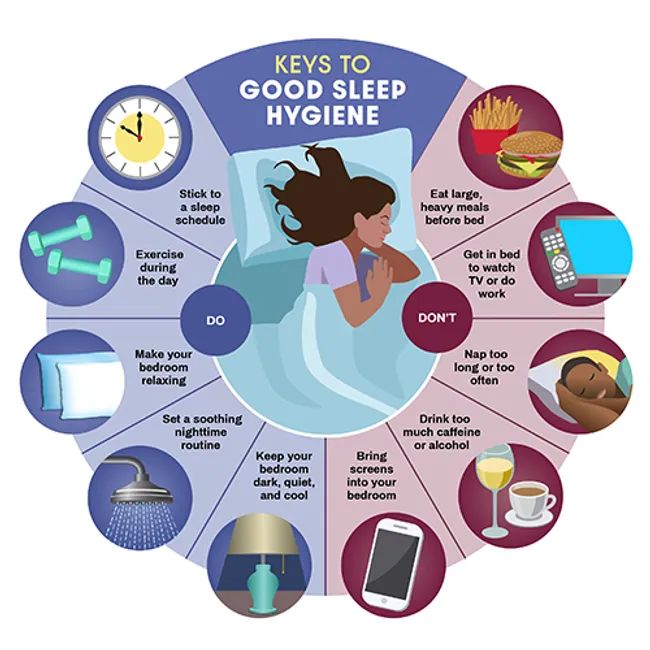Hygiene
A small word. Most of us, when we hear this word, think about our daily routine of bathing, changing into fresh clean clothes, cleaning our rooms etc to be hygiene.
Over thousands of years, humanity has evolved to a point where hygiene is a must, rather than just an add on.
It prevents diseases, improves quality of life and makes us more presentable to the society. But what If I told you, most of us fail to recognise and maintain a very distinct yet important type of hygiene.
we’ll be talking about – Sleep hygiene.The 1st question that pops up is – what is sleep hygiene?
Well, Sleep hygiene consists of environmental changes and overall habits that pave the way for higher-quality sleep and overall better health.
Good sleep hygiene is all about putting yourself in the best position to sleep well each and
every night.
Why sleep hygiene?
Obtaining healthy sleep is important for both physical and mental health.
It improves productivity and overall quality of life.
Everyone, from children to older adults, benefit from better sleep, and sleep hygiene plays a key part in achieving that goal.
Research has demonstrated that good sleep is a central part of health. Crafting sustainable and beneficial routines will make healthy behavior automatic and creates an ongoing process of positive reinforcement.
On the flip side, bad habits can become somewhat permanent and they cause negative consequences.
We all suffered from sleepless nights at one point of our life – wondering what it would take to finally fall asleep and wake up fresh.
Various studies worldwide have shown that almost 1 in every 3 person suffers from sleep related problems worldwide. This is a very significantly ignored problem.
Improving sleep hygiene has little cost and virtually no risk, which makes it an important part of a strategy to counteract the serious problems of insufficient sleep and insomnia.
So, let’s begin with a few Signs of Poor Sleep Hygiene.
Having a hard time falling asleep experiencing frequent sleep disturbances suffering daytime sleepiness these are tell-tale signs of poor sleep hygiene.
And the long-term consequences of this include –having concentration and memory problems Lower performance on the job or at school Slowed reaction time while driving and a higher risk of accidents Increased risk of Mental health disorders, such as depression, an anxiety disorder or substance abuse Increased risk and severity of long-term diseases or conditions, such as high blood pressure and heart disease S0, How Do You Practice Good Sleep Hygiene?
Optimizing your sleep schedule, pre-bed routine, and daily routines is part of harnessing habits to make quality sleep feel more automatic. At the same time, creating a pleasant bedroom environment can be an invitation to relax and doze off.
A handful of tips can help in each of these areas.
You can adapt them to fit your circumstances and create your own sleep hygiene checklist
to help get the best sleep possible.
Number 1:
Set Your Sleep Schedule Having a set schedule normalizes sleep as an essential part of your day and gets your brain and body accustomed to getting the full amount of sleep that you need.
Have a Fixed Wake-Up Time: Regardless of whether it’s a weekday or weekend, try to wake up at the same time since a fluctuating schedule keeps you from getting into a rhythm of consistent sleep. Prioritize Sleep: It might be tempting to skip sleep in order to work, study, socialize, or exercise, but it’s vital to treat sleep as a priority.
Calculate a target bedtime based on your fixed wake-up time and do your best to be ready for bed around that time each night.
Make Gradual Adjustments: If you want to shift your sleep times, don’t try to do it all in one fell swoop because that can throw your schedule out of whack. Instead, make small, step-by-step adjustments of up to an hour or two so that you can get adjusted and settle into a new schedule.
Don’t Overdo It with Naps: Naps can be a handy way to regain energy during the day, but they can throw off sleep at night. To avoid this, try to keep naps relatively short and limited to the early afternoon.
Number 2:
Follow a Nightly Routine How you prepare for bed can determine how easily you’ll be able to fall asleep.
A pre-sleep playbook including some of these tips can put you at ease and make it easier
to get to fall asleep when you want to.
Keep Your Routine Consistent: Following the same steps each night, including things like putting on your comfortable night clothes and brushing your teeth, can reinforce in your mind that it’s bedtime.
Budget 30 Minutes for Winding Down: Take advantage of whatever puts you in a state of calm such
as soft music, light stretching, reading, and/or relaxation exercises.
Dim Your Lights: Try to keep away from bright lights because they can hinder the production of melatonin, a hormone that the body creates to facilitate sleep.



